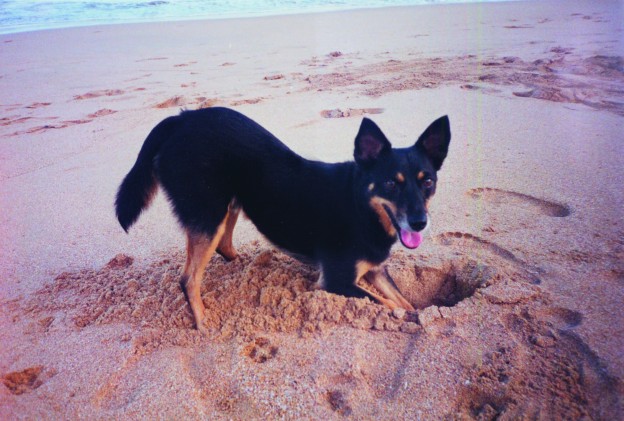
Why do dogs dig and how can you prevent it? Kate Potter investigates how to put an end to their burying behaviour.
Every ounce of joy your canine companion brings to your life can be swiftly forgotten the moment you discover your prized petunias distributed in tattered shreds across the yard and your dog head down, tail up in the dirt, industriously digging his way to China.
If your dog is an enthusiastic digger, take a moment to evaluate why he’s doing it before you either punish him or try to change his behaviour.
Saving for a rainy day
Dogs are nothing if not prepared. Even though you know you’ll feed and look after your dog each day, he knows it’s better to be safe than sorry and will stash anything important to him, like bones or chew toys, in a special place he can access when he needs to. He may even repeatedly dig items up and bury them in new places — kind of like the human equivalent of tidying up the shed. Dogs that spend time inside may try to bury things in couch cushions, under piles of laundry or even try to dig through carpet.
Sam Lewis, from Sherlock Bones in Adelaide, reminds us that even though our dogs are pets and a part of our families, their heritage is of wild, pack-dwelling, self-sufficient hunters.
“Dogs love to dig for bones and stash food for lean times. It’s a natural behaviour but sometimes certain circumstances may exacerbate their digging,” Lewis says.
If your dog is a hoarder, consider not giving him treats that he won’t finish in one sitting, such as large bones. Alternatively, wait until your dog has had his fill or finished playing with an item and remove it before he has the chance to bury it.
When it comes to having a rest, dogs appreciate a comfy spot just as much as people do. If it’s too hot or cold outside, your dog may dig a hole in a strategic shady or sunny spot in the garden that allows him to rest at a comfortable temperature.
Lewis says that inside naps are no different. “Dogs like to ‘fluff up’ a sleeping site before turning around and lying down, which can easily be misconstrued as attempts to dig through the couch or floor,” he explains.
Lending a helping hand (or paw)
Most dogs find the lure of freshly turned soil irresistible, so Lewis advises against gardening with your dog. “Dogs love to help and when they see you digging they think it looks like great fun and want to get involved,” he says. “They’ll help you find that bone you were supposedly looking for long after you decide you’ve finished gardening.”
For some dogs, especially terriers, digging may just be an enjoyable pastime. In these cases, Lewis suggests encouraging them to target an approved area, like a digging pit.
“Plastic sandpits filled with sand are perfect,” says Lewis. “Hiding treats and toys in the sand will keep your dog interested and encourage him to dig an area you’re happy for him to be in.”
Other behavioural problems you need to rule out include boredom, stress and separation anxiety. Make sure your dog gets lots of exercise and mental stimulation to help burn off all of his energy. A happy, tired dog is a good way to keep your garden free of holes.
Busy Beagles
Ashlee Baghurst’s Beagles, Chewy and Polly, are persistent escape artists.
“Often I’ll get home from work to discover a crater under the back fence and my dogs visiting our neighbours. They love following scents so much that it seems to drive them to find new adventures to get involved in when we’re not home,” Baghurst says.
These days, Chewy and Polly are one step behind their savvy humans, who believe that their dogs’ safety is paramount and have found a way to keep them in the right backyard.
“Very rarely do they actually manage to escape anymore,” Baghurst says. “We’ve worked hard to secure the yard by placing bricks and wooden sleepers in their way at the base of the fence.”
For dogs who don’t like being left alone, Lewis says the stress of their isolation can cause them to try and dig an escape tunnel from their confinement area.
“Dogs like to feel safe, so if they suffer from separation anxiety they may try to go and find their ‘pack’ — be it their family or other company — to make them feel secure,” he says.
Make training easier with help from the professionals - on our DOGSLife Directory now!



